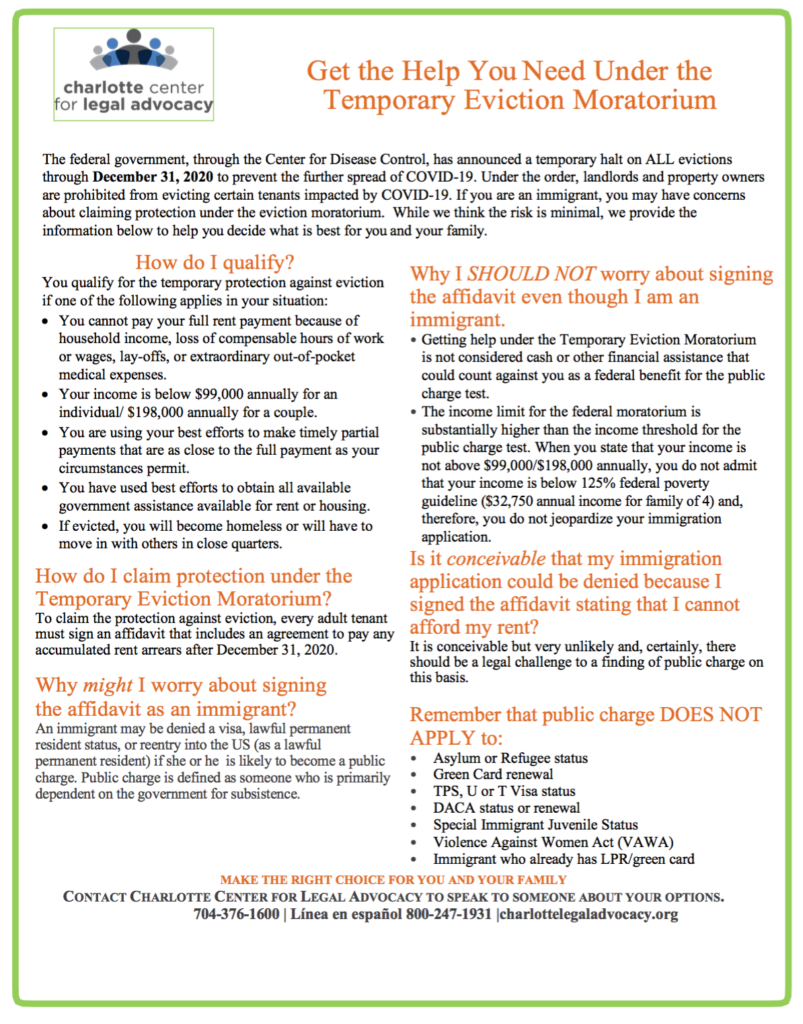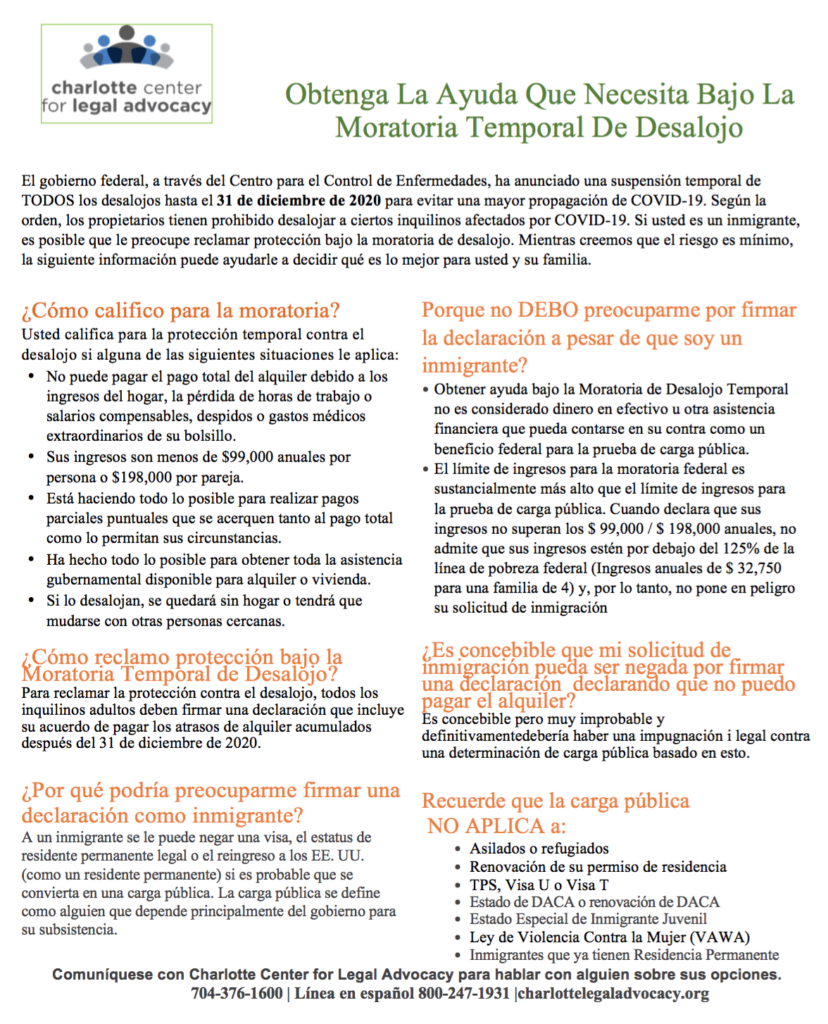Every day, immigrant families live in fear of separation and suffer from chronic stress while struggling to build a stable life in a community that keeps them on the fringes.
These are the findings of a recent report documenting the harm of the Trump administration’s deliberate attacks on immigrants living in the Carolinas and across the U.S.
In collaboration with Charlotte Center for Legal Advocacy and South Carolina Appleseed, the Center for Law and Social Policy (CLASP) has released its findings based on interviews with a range of professionals serving the immigrant community—including childcare providers, nursing home visitors, health and mental health care providers, health insurance navigators, nutrition assistance providers, and legal service providers.
“The Trump Administration has repeatedly shown indifference to the effects of its policies and rhetoric on children across the country and in some cases is deliberately using harm to immigrant children as a political lever,” said Madison Allen, co-author of the Carolinas report and senior policy analyst/attorney at CLASP. “We found that parents are altering their daily lives and avoiding public health, nutrition, and education programs because of these relentless attacks. We heard stories about parents being detained in front of their children, kids who are afraid to go outside and play, and chronic stress that will have long-term consequences for many children.”
Charlotte’s foreign-born population makes up 10 percent of the total population, with most individuals coming from Latin America (50 percent) and Asia (31 percent). This population has grown significantly over the past 10 years.
With one in four children having at least one immigrant parent, the report illustrates the deliberate detrimental impact this administration’s rhetoric and policies are having on children and, by extension, our greater community.
Through interviews conducted between January and March 2020 in the Charlotte metro and Columbia, S.C. areas, recurring themes echoed the harmful and deep impacts families experience because of the Trump administration’s harmful rhetoric and zero-tolerance enforcement tactics.
Interviewees shared stories of how the constant, looming fear of immigration enforcement dramatically impacts daily life for immigrant parents and children in their communities.
Parents and caregivers are afraid to leave their homes to work or take care of everyday necessities out of fear that they will not return home to their families. That fear is not limited to adults either. Children of all ages are also experiencing and internalizing chronic stress and anxiety that impacts their health and wellbeing in ways that will linger for years.
Providers shared concerns about the children who are living at homes with chronic ongoing stress and what that means for their future. As a nurse practitioner explained, “the increase in cortisol and the inflammatory markers that go along with stress precipitates a lot of chronic disease.”
Families are also avoiding publicly funded health and nutrition services for which they are eligible specifically due to the administration’s new Public Charge rule. The rule, which went into effect Feb. 24, expands the types of benefits considered in the “public charge” immigration test administered to immigrants entering the country or seeking permanent residency to determine if they will become primarily dependent on the government for financial support.
The rule has faced several court challenges since going into effect with decisions just in the last month that have put it on hold and then resumed it again, adding to confusion about what options families have.
Immigrants without legal status do not qualify for most public benefits. Most immigrants with status who do qualify for public benefits along with all U.S. citizen family members are not subject to the rule. Also, several types of public benefits are not included in the assessment, such as WIC, NC Health Choice and Emergency Medicaid. This hasn’t stopped families from withdrawing from stabilizing programs out of fear.
In the report, Advocacy Center staff shared several stories of families choosing not to enroll in benefits.
One story involved a woman from Mexico who had been a U.S. citizen for 20 years. During a meeting to enroll in health coverage, a health insurance navigator shared that the woman was eligible to sign up for food stamps (SNAP benefits) based on her income. The woman declined “… because of the public charge, she thought it applied to her … and she was just really scared.”
Medical-Legal Partnership coordinator Elizabeth Setaro has been leading the Advocacy Center’s efforts to help families fight fear with facts.
“Through education and outreach, we are making sure families understand what they’re entitled to receive and have access to the necessary resources that ensure they remain stable during these uncertain times,” Setaro said.
On top of policy threats at the federal level, immigrant families in the Carolinas face added barriers when accessing safety net programs like Medicaid due to shortcomings in the state eligibility software and training for social services staff. These systems are difficult for most people to effectively navigate without assistance, especially when English is a second language.
CLASP’s research found that conditions for immigrant children and their families in the Carolinas were exacerbated by confusion, misinformation and limited availability of legal services, specifically in South Carolina.
In the Charlotte region, the Advocacy Center is the largest provider of free and low-cost legal services for immigrant families, but additional options for legal assistance are limited beyond hiring a private attorney.
Private immigration attorneys are often not well versed on immigrant eligibility for public benefits, which also adds to confusion and uncertainty.
The Advocacy Center fights to ensure equal access to resources under the law for immigrant families. That includes working with service providers and the immigrant community to help families understand and access local resources that are available, while also holding administrative and government systems accountable to provide services families are entitled to receive.
The report’s findings illustrate the need for policies that equitably ensure safety, economic security and stability for all families, including immigrants.
Such policies would enable all people to live their lives as productive citizens engaging in civic and economic life without fear and build a strong community that allows families to thrive.
Learn more by reading the report, “Trump Administration Immigration Policies Are Harming Children and Families in the Carolinas”.


